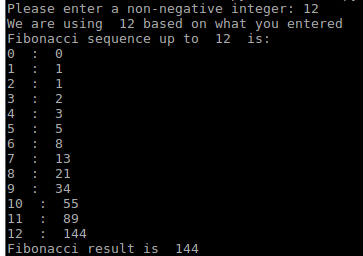If time is important (not programming techniques):
function f = fib(n)
if (n == 1)
f = 1;
elseif (n == 2)
f = 2;
else
fOld = 2;
fOlder = 1;
for i = 3 : n
f = fOld + fOlder;
fOlder = fOld;
fOld = f;
end
end
end
tic;fib(40);toc; ans = 165580141; Elapsed time is 0.000086 seconds.
You could even use uint64. n = 92 is the most you can get from uint64:
tic;fib(92);toc; ans = 12200160415121876738; Elapsed time is 0.001409 seconds.
Because,
fib(93) = 19740274219868223167 > intmax('uint64') = 18446744073709551615
Edit
In order to get fib(n) up to n = 183, It is possible to use two uint64 as one number,
with a special function for summation,
function [] = fib(n)
fL = uint64(0);
fH = uint64(0);
MaxNum = uint64(1e19);
if (n == 1)
fL = 1;
elseif (n == 2)
fL = 2;
else
fOldH = uint64(0);
fOlderH = uint64(0);
fOldL = uint64(2);
fOlderL = uint64(1);
for i = 3 : n
[fL q] = LongSum (fOldL , fOlderL , MaxNum);
fH = fOldH + fOlderH + q;
fOlderL = fOldL;
fOlderH = fOldH;
fOldL = fL;
fOldH = fH;
end
end
sprintf('%u',fH,fL)
end
LongSum is:
function [s q] = LongSum (a, b, MaxNum)
if a + b >= MaxNum
q = 1;
if a >= MaxNum
s = a - MaxNum;
s = s + b;
elseif b >= MaxNum
s = b - MaxNum;
s = s + a;
else
s = MaxNum - a;
s = b - s;
end
else
q = 0;
s = a + b;
end
Note some complications in LongSum might seem unnecessary, but they are not!
(All the deal with inner if is that I wanted to avoid s = a + b - MaxNum in one command, because it might overflow and store an irrelevant number in s)
Results
tic;fib(159);toc; Elapsed time is 0.009631 seconds.
ans = 1226132595394188293000174702095995
tic;fib(183);toc; Elapsed time is 0.009735 seconds.
fib(183) = 127127879743834334146972278486287885163
However, you have to be careful about sprintf.
I also did it with three uint64, and I could get up to,
tic;fib(274);toc; Elapsed time is 0.032249 seconds.
ans = 1324695516964754142521850507284930515811378128425638237225
(It's pretty much the same code, but I could share it if you are interested).
Note that we have fib(1) = 1 , fib(2) = 2according to question, while it is more common with fib(1) = 1 , fib(2) = 1, first 300 fibs are listed here (thanks to @Rick T).

